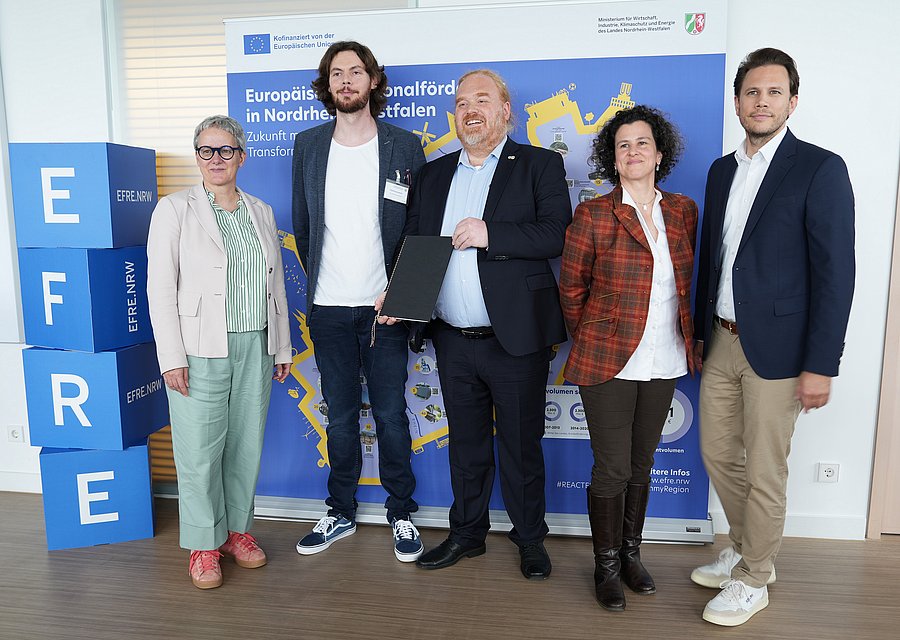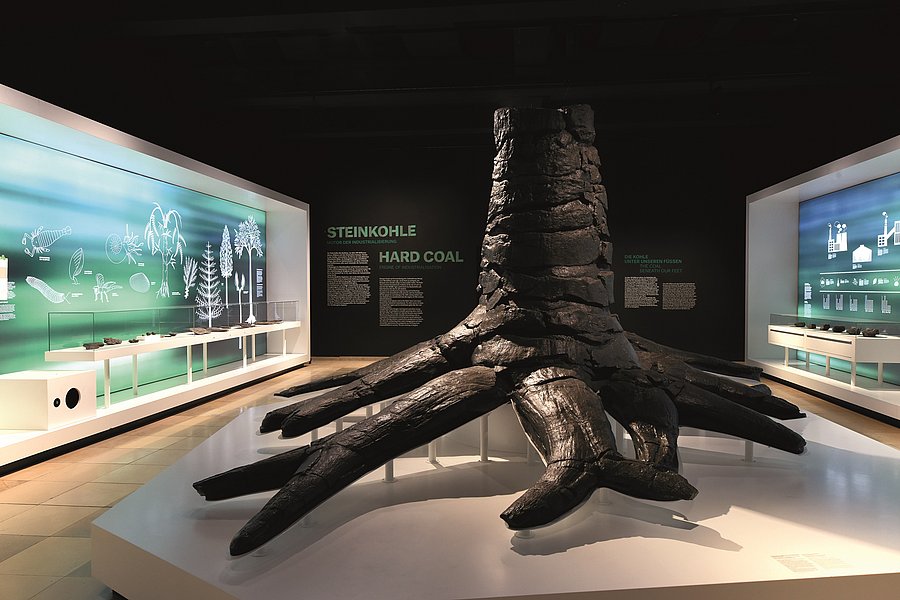Innovation for many
High-quality and simple: researchers develop new methods for 3D visualisations

Starting signal for Just Scan It 3D: The project team led by Erik Freier (centre, University of Wuppertal) received the grant notification in person from State Secretary Silke Krebs (left, Ministry of Economic Affairs, Industry, Climate Action and Energy of the State of North Rhine-Westphalia) // Photo MWIKE NRW
Pull out your smartphone, take a photo of your new kitchen and, after a short time, invite your friends from all over the country on a virtual tour - the areas in which the technology behind this can be used are many and varied. The benefits, as the recently launched research project "Just Scan It 3D" aims to show, go far beyond private pleasure.
Together with the educational service provider schnaq, the insurance service provider Control Expert and the Deutsches Bergbau-Museum Bochum, scientists at the University of Wuppertal are working on solutions to create high-quality virtual worlds as easily as possible.
Feedback in just a few seconds
Interest in 3D visualisations - whether for gaming or for training employees - has increased enormously in recent years. Previous methods of creation were based on expensive and technically demanding equipment. In addition, the post-processing of the data produced often takes a lot of time and computer power. Despite already impressive results, the finished 3D model depends heavily on the number and quality of the original images. The aim of the project consortium is therefore to speed up and simplify the image generation process with the help of artificial intelligence (AI). The aim will also be to improve the level of detail and accuracy of the 3D models. "With the emergence of intuitive AI applications such as ChatGPT, AI-based methods are also becoming increasingly relevant for end customers in 3D reconstruction," emphasises Erik Freier, Managing Director of the Interdisciplinary Center Machine Learning and Data Analytics (IZMD) at the University of Wuppertal.
The technical processes developed in the "Just Scan It 3D" project will later be openly accessible to very different groups of users, for example via a smartphone using an app.

3D visualisation via smartphone app: the project team will be working on making this possible in the future. // Photo Colourbox
Approach
The researchers are building on existing 3D reconstruction methods (including photogrammetry and neural radiance fields) and combining them with artificial intelligence methods, in particular deep learning approaches, in which the computer learns to recognise patterns based on large amounts of data. The advanced methods should then be able to quickly recognise the missing image data for the creation of a high-quality 3D model without a long processing time, for example. "The vision," says Freier, "is to give users feedback in just a few seconds as to whether further images of an object are needed to create a precise, digital image, and from which exact location."
The development of the solution is based on three practical use cases:
- AI-based detection and regulation of damage to motor vehicles based on on-site image recordings (Control Expert)
- Recordings for the creation of interactive 3D learning spaces for various (further) education formats (schnaq)
- Digital archiving, public accessibility and condition monitoring of cultural and industrial heritage objects (Deutsches Bergbau-Museum Bochum)
Proven expertise from the world of science
The University of Wuppertal contributes expertise from various research teams: In addition to the IZMD, Prof Dr Tobias Meisen's Institute for Technologies and Management of Digital Transformation and Dr Matthias Rottmann's junior research group Applied and Computational Mathematics AI Lab are also involved. In their research, the scientists involved deal with the technical development of immersive media for vocational training, among other things, have many years of experience in the development of AI-based methods for automated error detection in industrial production processes and are intensively involved in the training of AI models for error-free interpretation of image data.

View of the trunk remnant of a scale tree from the Carboniferous period (approx. 306 million years ago) in the "Hard Coal" tour. Objects like this one from the Deutsches Bergbau-Museum Bochum could be digitally archived quickly and easily in future using the new application. // Photo: Helena Grebe
The "Just Scan It 3D" project is being funded by the Ministry of Economic Affairs, Industry, Climate Action and Energy of the state of North Rhine-Westphalia and the European Union from the European Regional Development Fund (ERDF). The project partners received their grant notification in person from State Secretary Silke Krebs in Düsseldorf last Wednesday. The project is being funded with a total of around 2.3 million euros. The University of Wuppertal's share amounts to around 1.3 million euros.

